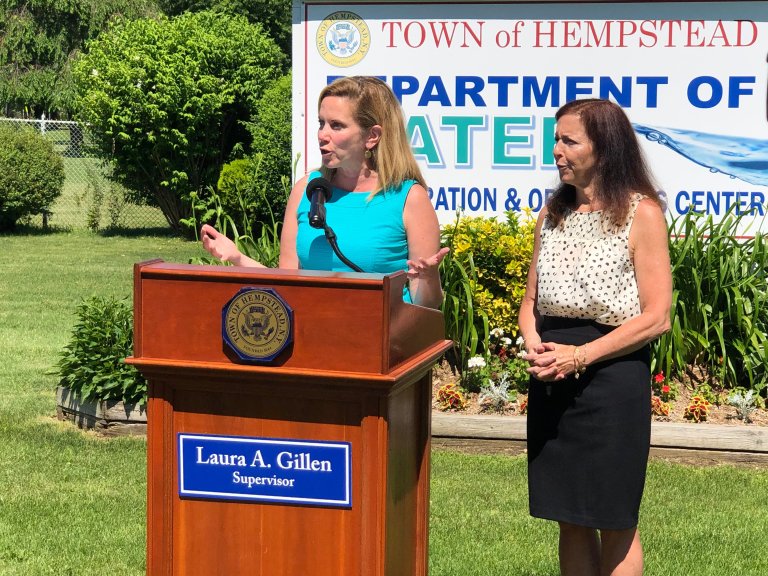
Hempstead Town Supervisor Laura Gillen is calling on Gov. Cuomo to sign legislation that would end a legal loophole barring lawsuits against chemical manufacturers.
The legislation would pave the way for Hempstead to file suit against chemical manufacturers that the town believes is responsible for the contaminant 1, 4 – dioxane found in its drinking water but has not identified.
According to Gillen’s office, under current state law, a lawsuit seeking to hold chemical manufacturers responsible for polluting the town’s water supply could fail because the action must be filed within three years of the contamination occurring.
Gillen’s office said the contamination of town drinking water could have begun as early as the 1940s.
A bill changing the statute of limitations for lawsuits regarding water contamination has passed in the state Assembly and Senate in June. The office of bill sponsor Assemblymember Fred W. Thiele explained in a statement that current law has interpreted the statute of limitations as beginning three years after the contamination occurred, as opposed to being detected. The law would start the three-year limit at the time of discovering contaminants.
“Closing this loophole that has allowed polluters to evade responsibility has been one of my top legislative priorities for the 2019 Legislative Session. I was pleased to be a part of this successful effort,” Thiele said in a statement.
The bill now awaits the signature of Gov. Cuomo.
On a Tuesday vote, the Hempstead Town Board voted in support of Gillen’s call for a lawsuit.
Michael Fricchione, the media representative for Gillen’s office, said, “Sher Edling LLP has been retained to sue for impacts and claims associated with new groundwater quality regulations.”
He could reveal not who or what chemical manufacturers Gillen and the town would be going after. Fricchione explained that they are beginning to pursue legal counsel in hopes of Cuomo signing the bill into law.
Fricchione said that the Town is now going to craft a complaint against chemical manufacturers.
Gillen said she intends to sue polluters who tainted the town’s water supply once the contaminant bill becomes law.
Gillen joined a bi-partisan group of Long Island leaders at a June press conference to urge the U.S. Environmental Protection Agency to set drinking water standards for contaminants.
On June 7, U.S. Reps. Kathleen Rice (D-Garden City), Tom Suozzi (D-Glen Cove), Peter King (R-Seaford) and Lee Zeldin (R-Shirley) had signed a letter calling on the agency to set a national standard for maximum contaminant levels of chemicals such as 1,4-dioxane, which the EPA says is likely a carcinogen.
“Clean, safe drinking water is a human right,” Gillen said in a statement. “That right, however, comes with a price tag and I believe that those who pollute our water should be the ones responsible for the costs of cleaning it up.”
Gillen’s office cited a recent report from the New York Public Interest Research Group that revealed the Town of Hempstead Water District has the highest reported level of PFOA contamination in the entire state and has tested positive for 1, 4 – dioxane.
The report cited by Gillen is a report done by the New York Public Interest Research Group entitled “What’s in my Water?: Emerging Contaminants in New York’s Drinking Water Systems.” The report found that nearly 16 million New Yorkers are served by water systems that detected one or more UCMR-3 Contaminants.
The report also found that the Long Island region has, by far, the most detections of emerging contaminants found in drinking water. While the report does note that the mere existence of emerging contaminants in drinking water does not put a consumer’s health at risk, it is still essential for public officials to respond via science and research and New Yorkers to be aware of the contaminants.
According to the study, 6.4 million New Yorkers are served water which has not been tested for emerging contaminants.
The NYPIRG study recommends that the state Department of Health immediately begin statewide testing of all public water systems, that the state must establish stringent drinking water standards for unsafe chemicals and that the state also requires testing for private household wells.
“Our residents have a few expectations when it comes to their drinking water. They expect that water suppliers will maintain and provide clean and safe drinking water and they expect that the government will alert them when there are water quality issues,” Gillen said at the press conference.
Gillen said household products such as cosmetics, detergents, and shampoos are the source of these emerging contaminants as well as industrial solvents used to produce nonstick cookware like Teflon. These contaminants and solvents are both classified as ‘likely carcinogens’ by the U.S. Environmental Protection Agency, according to Gillen’s office.
At a June 26 press conference, Gillen invited Adrienne Esposito, executive director of Citizens Campaign for the Environment, to speak.
“We have been aggressively pushing for this bill to become law but it’s an uphill climb against a powerful industry,” said Esposito. “Chemical companies want to line their pockets instead of doing the right thing and paying to clean up the water they polluted.”






